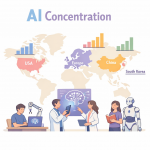Artificial Intelligence (AI) is no longer just a buzzword—it has become a transformative force in education. From automated grading to personalized learning paths, AI tools are reshaping how students engage with knowledge and how educators deliver content. However, with this rapid integration comes an important responsibility: using AI ethically (Refer).
As a course creator or tutor, you must know when to leverage AI’s potential and when to rely on human expertise, ensuring that technology supports—not replaces—the integrity of learning.
1. Why Ethical AI Matters in Education
AI has the power to:
- Personalize learning journeys for students.
- Provide instant feedback and assessment.
- Automate administrative tasks, saving tutors’ time.
But unchecked use of AI can lead to:
- Plagiarism and over-reliance on machine-generated content.
- Biases in AI tools that may misrepresent knowledge.
- Misalignment with curricula if AI-generated material doesn’t follow state board or exam mandates.
For tutors, this means balancing innovation with accountability.
2. Where Tutors Should Use AI
AI can be a support system if applied thoughtfully:
- Content Structuring & Brainstorming: Use AI tools to outline chapters, generate topic sequences, or suggest examples.
- Personalized Learning Plans: AI can analyze student performance data to recommend areas of focus.
- Practice Questions & Mock Tests: AI can help generate variations of questions for practice, especially in subjects like math or science.
- Language Support: For multilingual classrooms, AI can help create translations or simplified explanations.
👉 Tip for tutors: Always cross-check AI-generated material with textbooks, board syllabi, and your teaching expertise before presenting it to students.
3. Where Tutors Should NOT Use AI
Ethical responsibility means knowing the limits. Avoid:
- Copy-Paste Course Content: Directly lifting lessons, assignments, or study material from AI apps without editing. This can mislead students and dilute academic standards.
- Replacing Human Judgment: AI lacks contextual understanding; don’t use it to grade essays or subjective answers without human review.
- Curriculum Misalignment: AI may suggest topics that don’t match the state board syllabus or CBSE/ICSE mandates. Always validate.
- Sensitive Assessments: Avoid relying on AI for emotional, psychological, or ethical topics where human empathy is crucial.
4. Refining AI Input Into Curriculum-Relevant Content
The golden rule is: AI is a draft partner, not the final author.
Steps for tutors to ensure curriculum alignment:
- Extract ideas: Use AI to get multiple ways of explaining a topic.
- Cross-check with syllabus: Compare with the prescribed chapters in state or CBSE/ICSE boards.
- Refine sequence: Reorder AI suggestions to match how concepts build in your curriculum.
- Localize examples: Replace generic AI examples with culturally and academically relevant ones.
- Add teacher insights: Enrich the content with your teaching experience, analogies, and real-world applications.
5. Building Ethical Awareness in Students
As tutors, your role is not only to teach but also to guide students in using AI responsibly. Teach them:
- How to use AI for learning, not cheating.
- Why critical thinking matters when checking AI-generated answers.
- How to cross-verify facts with textbooks and reliable academic sources.
This fosters independent learners who see AI as a tool, not a shortcut.
FAQs on Ethical AI in Education
What does ethical AI mean in education?
Ethical AI in education refers to using Artificial Intelligence tools responsibly—ensuring accuracy, fairness, and alignment with learning standards. It means AI should assist tutors and students without encouraging plagiarism, bias, or shortcuts that harm genuine learning.
How should tutors use AI tools in their teaching?
Tutors should use AI as a supportive assistant, not a replacement. They can use it to brainstorm lesson outlines, generate quizzes, create practice questions, or suggest explanations. However, tutors must refine and verify the content so it aligns with the state board or CBSE/ICSE curriculum.
Where should tutors avoid using AI in education?
AI should not be used for copy-paste content, subjective grading, or sensitive topics that require human empathy. Tutors must also avoid using AI content that isn’t cross-checked with the syllabus, as this can mislead students and reduce academic quality.
Can AI-generated content fully replace textbooks or teachers?
No. AI is a supportive tool, not a substitute for teachers or textbooks. While AI can simplify concepts and generate quick notes, it cannot replicate the critical thinking, contextual judgment, and curriculum expertise that teachers bring to education.
How can tutors refine AI content for their curriculum?
Tutors should follow these steps:
Insert personal teaching insights.
This ensures AI content is accurate, contextual, and curriculum-compliant.
Generate ideas from AI.
Cross-check with board-prescribed chapters.
Re-sequence topics according to learning flow.
Add relevant local examples.
Why is it risky to rely on AI for assessments and grading?
AI lacks contextual understanding. It may misinterpret subjective answers or penalize creativity. For example, essays, open-ended math solutions, or ethical debates need human evaluation. Over-relying on AI could lead to unfair grading and demotivate students.
How can tutors teach students to use AI responsibly?
Tutors should educate students that AI is a learning aid, not a shortcut. Encourage them to use AI for practice, quick clarifications, or brainstorming ideas, but stress the importance of verifying answers and thinking critically. Students must understand the risks of plagiarism and shallow learning.
What role will ethical AI play in the future of education?
Ethical AI will make learning more personalized, accessible, and efficient, provided it’s used wisely. The future lies in AI-human collaboration: AI will handle repetitive tasks and data-driven insights, while teachers focus on mentorship, creativity, and emotional intelligence.
Final Thoughts
AI is a powerful ally in modern education, but only when used ethically. As a course creator, you must balance innovation with integrity. Use AI to enhance your teaching just like Kapdec but never as a substitute for your expertise or the rigor of board-approved curriculum.
REFERENCES
Ethics of Artificial Intelligence | UNESCO
Artificial Intelligence and the Future of Teaching and Learning (PDF) – US DEPARTMENT


